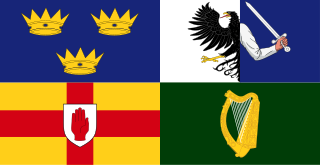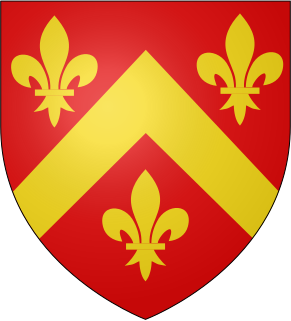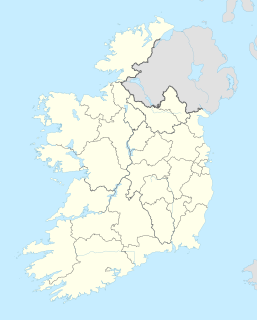
The British Empire comprised the dominions, colonies, protectorates, mandates and other territories ruled or administered by the United Kingdom and its predecessor states. It originated with the overseas possessions and trading posts established by England between the late 16th and early 18th centuries. At its height, it was the largest empire in history and, for over a century, was the foremost global power. By 1913, the British Empire held sway over 412 million people, 23% of the world population at the time, and by 1920, it covered 35,500,000 km2 (13,700,000 sq mi), 24% of the Earth's total land area. As a result, its political, legal, linguistic and cultural legacy is widespread. At the peak of its power, the phrase "the empire on which the sun never sets" was often used to describe the British Empire, because its expanse around the globe meant that the sun was always shining on at least one of its territories.

The Six Nations Championship is an annual international rugby union competition between the teams of England, France, Ireland, Italy, Scotland and Wales. The current champions are Wales, who won the 2019 tournament.

William III, also widely known as William of Orange, was sovereign Prince of Orange from birth, Stadtholder of Holland, Zeeland, Utrecht, Gelderland and Overijssel in the Dutch Republic from 1672 and King of England, Ireland and Scotland from 1689 until his death in 1702. As King of Scotland, he is known as William II. He is sometimes informally known in Northern Ireland and Scotland as "King Billy".

LaSalle County is located in the North Central region of the U.S. state of Illinois; it has an estimated population of 111,241 as of 2014 and its county seat and largest city is Ottawa.

The Kingdom of Great Britain, officially called simply Great Britain, was a sovereign state in western Europe from 1 May 1707 to 31 December 1800. The state came into being following the Treaty of Union in 1706, ratified by the Acts of Union 1707, which united the kingdoms of England and Scotland to form a single kingdom encompassing the whole island of Great Britain and its outlying islands, with the exception of the Isle of Man and the Channel Islands. The unitary state was governed by a single parliament and government that was based in Westminster. The former kingdoms had been in personal union since James VI of Scotland became King of England and King of Ireland in 1603 following the death of Elizabeth I, bringing about the "Union of the Crowns". After the accession of George I to the throne of Great Britain in 1714, the kingdom was in a personal union with the Electorate of Hanover.

The House of Stuart, originally Stewart, was a European royal house of Scotland with Breton origin. They had held the office of High Steward of Scotland since Walter FitzAlan in around 1150. The royal Stewart line was founded by Robert II whose descendants were kings and queens of Scotland from 1371 until the union with England in 1707. Mary, Queen of Scots was brought up in France where she adopted the French spelling of the name Stuart.
The Labour Party is a social-democratic political party in the Republic of Ireland. Founded in 1912 in Clonmel, County Tipperary, by James Larkin, James Connolly, and William X. O'Brien as the political wing of the Irish Trades Union Congress, it describes itself as a "democratic socialist party" in its constitution. Labour continues to be the political arm of the Irish trade union and labour movement and seeks to represent workers interests in the Dáil and on a local level.

In the game of rugby union, there are 15 players on each team, comprising eight forwards and seven backs. In addition, there may be up to eight replacement players "on the bench", numbered 16–23. Players are not restricted to a single position, although they generally specialise in just one or two that suit their skills and body types. Players that play multiple positions are called "utility players".

The Irish are a Celtic nation and ethnic group native to the island of Ireland, who share a common Irish ancestry, identity and culture. Ireland has been inhabited for about 12,500 years according to archaeological studies. For most of Ireland's recorded history, the Irish have been primarily a Gaelic people. Anglo-Normans conquered parts of Ireland in the 12th century, while England's 16th/17th-century (re)conquest and colonisation of Ireland brought a large number of English and Lowland Scots people to parts of the island, especially the north. Today, Ireland is made up of the Republic of Ireland and the smaller Northern Ireland. The people of Northern Ireland hold various national identities including British, Irish, Northern Irish or some combination thereof.
Miller and Millar are surnames of English language, Old English or Scottish origin. There are two homonymous forms of Miller, one that began as an occupational surname for a miller and another that began as a toponymic surname for people from a locale in Glasgow. Miller of the occupational origin may also be translated from many cognate surnames from other European languages, such as Mueller, Müller, Mühler, Moller, Möller, Møller, Myller, and others. There is also a form in the early English lingusitics as Milleiir.

Clan Broun also known as Clan Brown is a Scottish clan.

Bracknagh or Bracnagh is a small village in County Offaly, Ireland. It is at the junction of the R442 and R419 regional roads, halfway between Portarlington and Rathangan.

Mike Brown is an English professional rugby union player who plays fullback for Harlequins and the England rugby team. Brown joined the Harlequins senior team in 2005, having had previous youth career spells at Salisbury and Melksham, and began playing for the England first team two years later.

Great Britain is an island in the North Atlantic Ocean off the northwest coast of continental Europe. With an area of 209,331 km2 (80,823 sq mi), it is the largest of the British Isles, the largest European island, and the ninth-largest island in the world. In 2011, Great Britain had a population of about 61 million people, making it the world's third-most populous island after Java in Indonesia and Honshu in Japan. The island of Ireland is situated to the west of Great Britain, and together these islands, along with over 1,000 smaller surrounding islands, form the British Isles archipelago.

Levett is an Anglo-Norman territorial surname deriving from the village of Livet-en-Ouche, now Jonquerets-de-Livet, in Eure, Normandy. Ancestors of the earliest Levett family in England, the de Livets were lords of the village of Livet, and undertenants of the de Ferrers, among the most powerful of William the Conqueror's Norman lords.
The New England Colonies of British America included Connecticut Colony, the Colony of Rhode Island and Providence Plantations, Massachusetts Bay Colony, and the Province of New Hampshire, as well as a few smaller short-lived colonies. The New England colonies were part of the Thirteen Colonies and eventually became five of the six states in New England. Captain John Smith's 1616 work A Description of New England first applied the term "New England" to the coastal lands from Long Island Sound to Newfoundland.
English Americans are Americans whose ancestry originates wholly or partly in England. In the 2017 American Community Survey, English Americans are (7.1%) of the total population.

The military history of Ireland comprises thousands of years of armed actions in the territory encompassing the island of Ireland.

Independents 4 Change is an Irish political grouping registered as a political party since 2014. It was previously known as Independents for Equality Movement.















